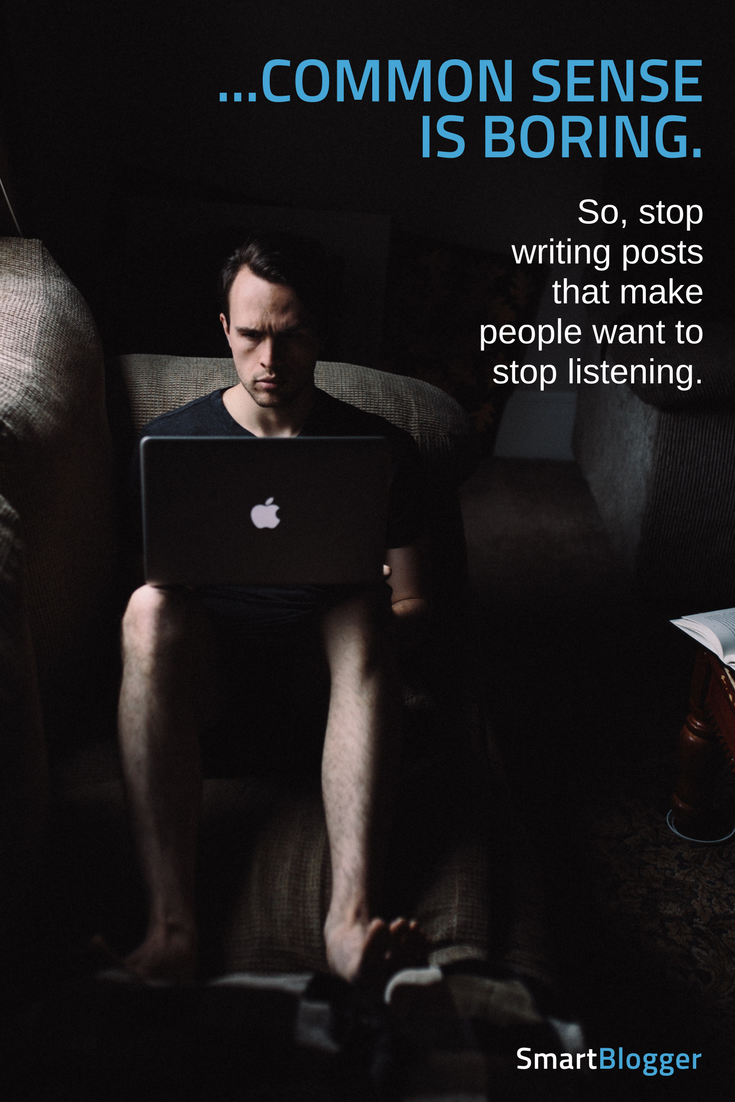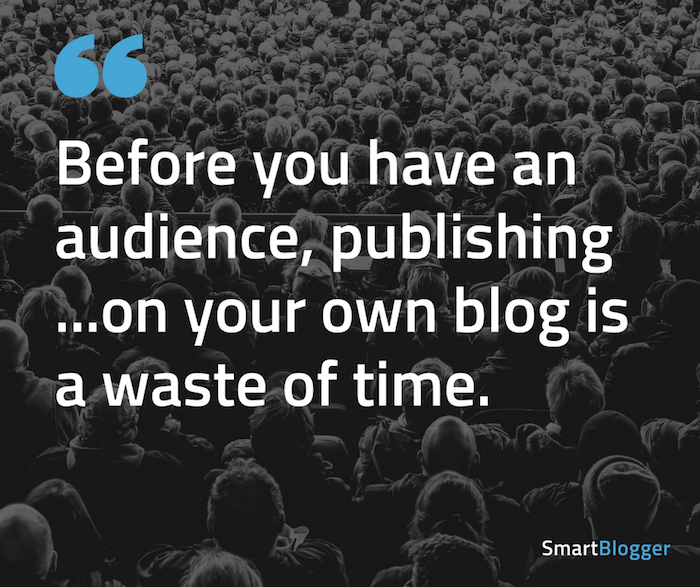
A troubling thought, isn’t it?
You’re slaving away at your blog, but you can’t help wondering if you have a shot in hell of getting anyone to read it.
What makes you any different from the millions of other bloggers hoping for attention?
You’re all doing the same stuff. Cranking out posts, messing around on Twitter and Facebook, leaving comments on popular blogs — you know, the usual.
But nobody gives a crap. Readers have seen it all before. You’re not offering anything new, so why should they hang around?
Good question. And the problem is, you don’t really have an answer.
Most of the time, you feel like you’re stumbling around in the dark. You can’t tell what’s working and what’s not. It feels like a big, never-ending guessing game.
Maybe you came here to find some answers. Maybe you’re hoping I’ll tell you what to do.
But I won’t.
Not because I don’t want to, but because sometimes you can’t understand what to do until you first understand what NOT to do. So, let’s start there.
Here’s a big, fat list of ways to be a mediocre blogger. How many are you guilty of?
1. Tell Stories
People love stories, but that doesn’t mean you should tell any. Here’s why: telling a boring story is worse than not telling any stories at all, and unless you’re trained in storytelling, yours are pretty much guaranteed to be boring.
If you doubt me, go to a bar and tell a story to someone in a voice loud enough for everyone to hear. If everybody in the bar stops talking to listen to you, you’re a good storyteller. If they don’t, you suck.
And almost everybody sucks.
2. Be “True to Yourself”
Let me guess. Tried-and-true marketing techniques just don’t feel right to you, so you’re scrapping it all in the name of authenticity?
Well, I’ll be damned. I must be psychic!
No, the truth is everyone feels that way in the beginning, and everyone has to do it anyway. To get good at something, first you have to follow proven techniques and screw it all up, and then you learn, and then you follow proven techniques and do it correctly, and then one day, when you’ve been doing it a long time, and you’re a freaking master, you invent your own techniques. Promoting your work is the same process as learning to play the piano.
If it feels inauthentic, it’s not because there’s something wrong with the technique. It’s because you’re doing it wrong, and you need to keep practicing.
3. Build Your Twitter / Facebook / Google+ / Pinterest / LinkedIn Following First
Here’s your thinking: the reason you’re not getting any traffic is because first you need to build your following on Twitter, Facebook, Google+, Pinterest, LinkedIn, or [ insert your social network here ]. Once you start getting some traction, then you can promote your blog, and the traffic will start flowing free and easy.
Heh. Wrong.
Yes, social networking is important, but you know what’s even more important? Focus.
By dividing your attention between so many different places, you’re pretty much guaranteeing you won’t do any of them well.
My advice: ignore social networks entirely in the beginning. Wait until you have 1,000 blog subscribers before you even think about building up a following somewhere else.
(And if you want to know how to get that first 1,000 without spending a nanosecond on Facebook or Twitter — here’s a clue.)
4. Write Short Posts
In my opinion, no beginning blogger should be publishing anything under 1,000 words. And really, 2,000 words should be your goal.
Why?
Three reasons:
- Readers perceive long content to be more valuable. They’re more likely to bookmark it, share it, and link to it.
- Most other bloggers are too lazy to write long content. If you’re willing to put in the effort, you’ll stand out.
- There’s some good evidence that Google prefers long form content. And giving Google what it wants is smart.
The bottom line: stop writing short posts. Or at least intersperse them with much longer content.
5. Give Common Sense Advice
Do you believe in preaching good old-fashioned common sense?
If so, I worry about your chances, because common sense is boring. Readers have already heard it so many times they tune out the minute they even catch a whiff of conventional wisdom.
“But… but… common sense is what they need!” you say. My response: it doesn’t matter. If nobody is paying attention to you, you can spout all the truth in the world, and it won’t do anybody any good. So, stop writing posts that make people want to stop listening.

6. Insist on Originality
The opposite of common sense is also dangerous.
Some writers also get so obsessed with being original that they become incapable of ever publishing anything. And when they do happen to stumble across an original idea, it’s so strange and foreign to the reader that they can’t even follow it.
The better approach: find ways to approach old topics from fresh angles. It’s a lot easier, and it’s a lot less risky.
7. Be Polite
Do you hold back from asking influencers for links because you’re worried about bugging them? Or worse, do you hold back giving your readers the truth because you don’t want to offend them?
Well, newsflash: real bloggers fight for their ideas. There’s no need to be obnoxious, but you can’t go around squeaking out requests for help and dancing around hard truths.
You have to demand attention. You have to take stands. You have to be totally and utterly shameless.
The world already has enough cowards. So please, don’t be another one.
8. Write “When You Can”
For a lot of people, finding time to write is like packing a suitcase.
You put in all the important things first, close it to see if everything fits, stuff in more things, check it again, and so on and so on until there’s no more room. Whatever doesn’t fit gets left behind.
In life, those “important things” that get scheduled first are your job and family. If you have any room left, you stuff in friends and relaxation and whatnot. And then, at the very end of the list, you have your writing.
Because it’s the last to be scheduled, it almost always gets “left behind.” Not because you want to neglect it, but because your life is already full to bursting, and you just can’t find the space for it.
The solution: schedule it first, not last. Make it one of the “important things” you put in the suitcase first. Believing you’ll find time for it otherwise is just delusional.
9. Worry About SEO
Speaking of delusional…
Lots of people see blogging as a way to get search engine traffic. Find a keyword you want to rank for, publish a post around it, and a few months later, you’ll have all the traffic you can handle.
Right?
Wrong.
Getting search engine traffic isn’t about keywords. It’s not even about blog posts. It’s about creating something so amazing everyone talks about it and links to it.

So do that. You can worry about SEO later.
10. Start Multiple Blogs
In my opinion, it’s pretty much impossible to build a popular blog in less than 10 hours a week. If you want to grow quickly, tack on an additional 10.
Say you have two blogs. 2 X 20 = 40 hours a week of work to grow both of them quickly.
Are you willing to dedicate that kind of time? Do you even have that much extra time in your week?
If not, pick the blog that’s most important to you and jettison the rest.
Otherwise, you’re not blogging. You’re just dabbling.
11. Search for the Perfect Domain Name
Blogs are like living things. They evolve. Even if you found the perfect domain name today, you would hate it a year from now, because the focus of your blog will change.

The better solution: pick a domain name that’s good enough and go with it. Sure, changing it later is a headache, but never having a blog because you’re such a damn perfectionist is an even bigger headache.
Pick it. Register it (affiliate link). Move on.
12. Show the World How Clever You Are
Got a clever domain name? A clever headline? A clever post?
You’re probably pretty tickled with yourself, right?
Well, I hate to break it to you, but cleverness almost always backfires. People won’t get it. Sure, they would understand if they spent a few minutes thinking about it, but they’re in a hurry, and there are a gazillion other blog posts to read that don’t require so much thought.
Instead, be clear. Don’t make people figure it out. They’ll reward you by coming back.
13. Try to Be Seth Godin
Every once in a while, I’ll give a student some advice, and they’ll respond with, “But that’s not what Seth Godin does!”
*strangles student*
Think of it like this. Let’s say you like to play a little US football.
If I handed you a helmet right now and pushed you into the middle of a professional game, how do you think you would do?
I’ll tell you how you would do: you would get your ass handed to you. Those guys are genetic freaks who have prepared their entire lives to do battle with other genetic freaks. You’ll never be able to do what they do, no matter how hard you try. In fact, even trying could be deadly.
It’s the same thing with Seth. He’s the blogging equivalent of a 350-pound lineman who can run a mile in under 4 minutes. In other words, he’s so freakishly talented he can do things nobody else can.
So, stop trying to copy him. You don’t have his kind of talent, and if you did, you wouldn’t want to copy him anyway. The whole thing is just silly.
14. Wait Until You’re in the Right Frame of Mind
This one is so tempting.
You’re feeling tired or frustrated or [ insert your negative emotions here ], and you think, “I’ll never be able to write like this. I’ll just stop and come back when I’m in a better frame of mind.”
The truth?
You’re procrastinating. You’re scared of how difficult it is to express your thoughts, and you’re using your emotions as an excuse to quit.
It’s understandable, but that’s not what good writers do. Good writers write.
It doesn’t matter if they are tired. It doesn’t matter if they are going through a divorce. It doesn’t matter if their kids are screaming. It doesn’t matter if they’re sick and dying in the hospital. It doesn’t matter if terrorists drop a nuclear bomb on their hometown.
They write. End of story.
15. Agonize over Your WordPress Theme
It’s the same issue as searching for the perfect domain. You’ll never find it, and even if you do, you’ll hate it later. So, pick something good enough and get on with your business.
You have 15 minutes. Go.
16. Wait Until [ Insert Freelancer Here ] Can Help You
Are you waiting for a graphic designer or programmer or copywriter or WordPress specialist to help you with something?
Well, stop. If you’re ever going to get anything done, you have to refuse to wait for anyone. Ever.
A lot of times that means doing without. You might have to give up your fancy theme modifications or custom logo or WordPress plugin. Sure, they would be useful, but do you really need them?
No. You need to get off your lazy butt and stop procrastinating.
17. Use Free (Or Cheap) Hosting for Your Blog
Can you get by with it?
Sure.
Should you get by with it?
Not if you can help it. Here’s why:
At some point in the future, you’re going to have a problem with your blog. It’ll get hacked or slow down or just disappear mysteriously, and you won’t know what to do.
If you have a free or cheap host, you’ll be on your own, and you’ll waste days or even weeks trying to figure it out. At the end of it all, you’ll realize how foolish you were to skimp on hosting and move to a premium host like WP Engine (affiliate link) who fixes stuff for you when it breaks.
Or you can be smart and just do it now. The choice is yours.
18. Build Your Rss Subscriber List
You didn’t get the memo? RSS is on life support, and it’ll die any day now.
Smart bloggers stopped depending on it a long time ago. Instead, we get our readers to subscribe via email.
So should you.
19. Publish Great Content — in the Wrong Place
Is great content important?
Sure.
Should you create as much of it as you can?
Absolutely.
But should you publish it on your own blog right now?
Probably not.
To explain why, imagine if Martin Luther King gave his “I Have a Dream” speech to an empty room. It’s one of the greatest speeches in history, no doubt, but without an audience, without anyone to hear it and spread the word, it loses power.
Great content works the same way. Before you have an audience, publishing it on your own blog is a waste of time.

You’re better off publishing it as a guest post instead. Borrow a blog that already has a huge audience and use it to funnel those readers into your list.
Then, once you have a small group of dedicated followers, really ramp up the content on your blog. Just not before.
20. Give Up
After reading through all these mistakes, you might feel like, “Well, damn. I’m just a screw-up. I might as well quit.”
But you shouldn’t. Here’s why:
We’re all screw-ups.
In my first three years, I made every mistake on this list. Every single one.
Not only did all my blogs fail, but I was banned by Google, my first guest post was rejected by Copyblogger, and I got so carried away bragging about my interview with Seth Godin he had to ask me to stop. Looking back, it’s horrifying how many mistakes I made.
But I’m still here.
I learned from each failure. I got advice from smart people. I mastered the craft.
Listen to other popular bloggers, and you’ll hear the same story. Over and over and over again.
It’s not a coincidence. That’s how success happens. You live and learn.
If you’re guilty of some of these mistakes, it just means you’re still in the beginning stages of the journey. Take your licks, do your best to learn from them, and never, ever lose faith in yourself.
You really can do this.
There’s nothing wrong with you.
Just.
Keep.
Going.
source https://smartblogger.com/mediocre-blogger/
No comments:
Post a Comment